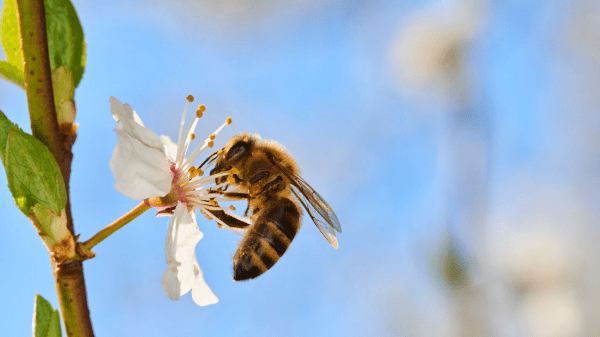Bee lovers have been thirsting for some good news about these vital insects, which by one estimate pollinate a third of the American food supply. But good news has been hard to come by.
An op-ed piece by Clay Bolt on The Hill blamed the widespread use of neoninotonoids for the heavy die-offs of bee populations in recent years.

Many of these are used in treated seeds, which are exempt from federal regulation.
“Iowa State University estimates that a single treated corn seed contains enough active ingredients to kill as many as 80,000 bees or, according to The Cornell Lab of Ornithology, a jay-sized songbird,” writes Bolt. “Considering the U.S. currently grows 90 million acres of corn with an average seeding rate of 30,000 seeds per acre, a back-of-the-napkin calculation suggests this crop alone harbors enough active ingredients to kill 216 quadrillion bees or the entire population of North America’s bird population 300 times over.
“These pesticides are now so common that nearly 100 percent of all non-organic corn and a significant portion of crops like soy and wheat are grown from neonic-treated seeds,” Bolt continues.
There’s no good news here.
A more hopeful article in Forbes highlights the apiary management of America’s richest farmers, billionaires Stewart and Lynda Resnick. Inside A Billionaire Bee Colony (forbes.com)
The Resnicks are better known as owners of The Wonderful Company BB #:115157, which pushed the formerly obscure pomegranate to the center of attention and whose Wonderful Halos are among the most successful citrus brands in recent years. Wonderful also produces nut crops.
“Before they owned their own bees,” Forbes tells us, “the Resnicks brought in as many as 75 different bee companies every year just to pollinate their almond orchards. The logistical nightmare had to end, so in 2015, Wonderful acquired four small beekeeping companies and bred their own stocks from that foundation.
“Last year, about 40% of the country’s managed bees died, the highest annual loss in 11 years, according to the Bee Informed project at the University of Maryland,” Forbes continues. “Wonderful, by contrast, says its bee population has been growing organically at an annual rate of 13%—the company hasn’t bought any new ones in five years—and the number of hives pollinating last year increased to 60,000 from 45,000 in 2021. There are roughly 60,000 bees in each hive.”
What’s the secret? Treating the bees well. Like other large beekeepers, the Resnicks prevent disease by keeping the bees cool. For three months during the winter, they are kept in temperature-controlled warehouses, extending their life cycle. “During the summer, after their pollinating work is done, many of the nation’s bees hang out in the northern prairies because there’s vast ranchland with wildflowers, and also because there’s the smallest amount of agricultural pesticides and herbicides,” Forbes continues.
Wonderful’s bee management practices are not unique—they are widely used by large bee companies—but they are difficult to implement except on a large scale. At the same time, large-scale operations can be especially vulnerable to collapse. One of the nation’s largest producers, Adee Honey Farms, based in South Dakota, lost 90 percent of its hives in 2007, according to Forbes.
Nevertheless, in the grim landscape of bee die-offs, we’ll take what good news we can get.



